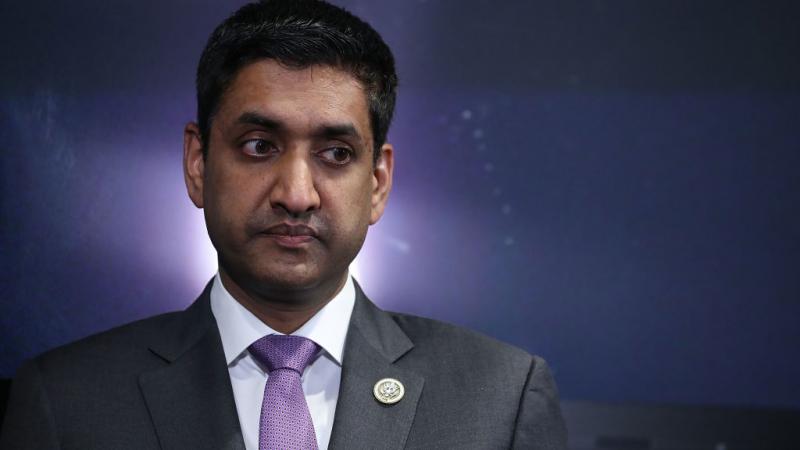Interest on national debt on pace to eclipse entitlements, defense spending amid funding battles
Criticism of sustained deficit spending prompted house Republicans earlier this year to pressure the White House to make budgetary concessions in the Fiscal Responsibility Act that aimed to address the nation's runaway spending. The debt service may soon exceed that of major allocations.
Sustained deficit spending by the U.S. government helped push the national debt up to a jaw dropping $31.38 trillion in 2023, according to U.S. Treasury data. Fiscal watchdogs are now predicting that the interest alone on that debt will soon eclipse both entitlements and defense spending as a major component of the annual budget.
At the same time that the national debt is at a record high, interest payments in mid-2022 stood at just under $600 billion, according to a report from the Committee for a Responsible Federal Budget (CRFB).
The report, which outlines the challenges that face the next administration, projects that such payments will exceed the combined costs of Medicaid, SNAP (food stamps), and Supplemental Security Income (SSI) in late 2023, though it varies depending on interest rates.
Debt service is projected to exceed defense spending either later this year or in 2026, again contingent on interest rates. The CRFB report further pointed to the significant hike in interest rates under the Biden Administration. A 10-year Treasury note, which in 2021 came with just over a 1% interest rate. That figure now sits at 4.3%.
Mortgage rates, which are at an all-time high, have been predicted to remain high as well; Fannie Mae says that it doesn’t expect rates to dip below 6% until the fourth quarter of 2024. Analysis from Rocket Mortgage says that during the Trump administration years "the average rate for a 30-year fixed mortgage was about 3.7%."
The issues of rising debt and rising interest rates clash head-on with major spending packages spearheaded by the administration, including the 2021 American Rescue Plan and the 2022 Inflation Reduction Act, which saw the government authorize $1.9 trillion and $740 billion in federal spending in addition to "ordinary" budget expenses.
Criticism of sustained deficit spending prompted House Republicans earlier this year to pressure the White House to make budgetary concessions in the Fiscal Responsibility Act that aimed to address the nation's runaway spending.
GOP budget hawks, however, were largely unsatisfied with the concessions House Speaker Kevin McCarthy managed to wrest from the administration and an upcoming showdown over budget resolutions threatens to shut down the government.
The Biden administration has largely depended on spending more and more on entitlements to bolster its support among demographics likely to vote Democratic.
Georgia Republican Rep. Marjorie Taylor Greene on Tuesday indicated that she would not support the administration's funding requests and would only support budget resolutions should the government meet her demands, which include an impeachment inquiry into Biden, the exclusion of COVID and Ukraine funding, and no funds to "weaponized" federal agencies.
"I will not vote to fund the government until we achieve an impeachment inquiry," she declared on the "Just the News, No Noise" television show. "But also I will not fund a weaponized government against President Trump, pro-life protesters, parents trying to hold their school boards accountable. I will not fund more COVID insanity, COVID vaccines, vaccine mandates, mask mandates all of these ruined American's lives and took away their freedoms."
"And I will not vote – and this has always been my stance – I will not vote to continue to slaughter people in Ukraine and to continue to fund the war in Ukraine," Green added. "This has to stop, we need a peace resolution between those two countries," she continued. "So those are my demands, not only for appropriations, but for any attempt if we have to get there for a short term [continuing resolution]."
In a separate interview on the program to be aired Wednesday, National Taxpayers Union Executive Vice President Brandon Arnold forecast a tense exchange over the funding disputes, but warned Republicans to formulate a winning strategy should they opt for a government shutdown, noting that Republicans had failed to secure concessions through such an approach before.
"I think it's time to get out the popcorn, and sit back and enjoy what's gonna be a wild few weeks," he said. "You know, MTG has her demands; there's 535 Members of Congress. And I think they are all approaching this with a similar manner. And that is, we're going to put our foot down and insist on getting our way. Otherwise, we're not going to vote for this package of spending bills."
"You know, the problem here is that we need to fund the government. And when we do shut down the government, we've done it several times in recent memory, conservatives almost always lose," Arnold continued. "We shut down the government for a few days, or sometimes a little bit longer, and then somebody gives in. There's a breaking point, and we end up spending more money... So we need to find a way to win here. And I think that starts with passing good conservative spending bills through the appropriations process in the House of Representatives."
Arnold went on to advocate for seeking compromise with moderate, budget-minded Democrats, and espoused support for exploring ways to save on defense spending, which ranks among the biggest budget items. Department of Defense data shows that it accounts for $2.04 trillion of the 2023 budget.
"There are some very reasonable Democrats out there that want to see leaner, more efficient government and I think we need to extend an olive branch and work with these individuals," Arnold opined. "Because heaven knows this problem was created in a bipartisan basis. Throughout the years, Republicans and Democrats have teamed up together to spend far too much money and eventually it's going to need to be solved in a bipartisan process..."
"We're going to need to get Democratic votes to get a solution here... I think there's a lot of Republicans that have kind of abandoned the neocon philosophy when it comes to foreign policy that are looking for ways to save money in the defense budget," he went on. "I think that's fantastic. We don't want to reduce our ability to launch those wars when we absolutely need to. But let's find some ways there... Let's reach out in a bipartisan manner. And let's try to get this federal budget under control."
Ben Whedon is an editor and reporter for Just the News. Follow him on Twitter.















